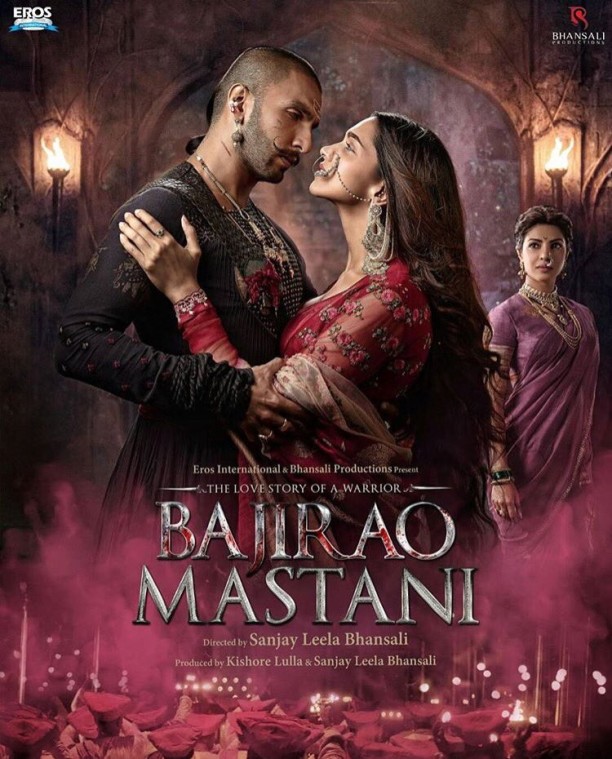 The cinematically grandeur hall of fame that is known as the Sanjay Leela Bhansali epics has another film to its feature wall. The era, the costumes, the sets… everything is at the scale of the veteran filmmaker modus operandi. Yet there is something about Bajirao Mastani that doesn’t fall into the niche as perfectly as its predecessors. It isn’t that Bhansali isn’t appropriate as a director for the historical and politically enticing tale of forbidden love. But somewhere in the research for the costumes, dialect, history and big screen adaptation of Nagnath S Inamdar’s Marathi novel Rau, we have missing pieces that point back to the veteran and his writing team, which includes himself, Mallika Dutt Gharde and Prakash Kapadia.
The cinematically grandeur hall of fame that is known as the Sanjay Leela Bhansali epics has another film to its feature wall. The era, the costumes, the sets… everything is at the scale of the veteran filmmaker modus operandi. Yet there is something about Bajirao Mastani that doesn’t fall into the niche as perfectly as its predecessors. It isn’t that Bhansali isn’t appropriate as a director for the historical and politically enticing tale of forbidden love. But somewhere in the research for the costumes, dialect, history and big screen adaptation of Nagnath S Inamdar’s Marathi novel Rau, we have missing pieces that point back to the veteran and his writing team, which includes himself, Mallika Dutt Gharde and Prakash Kapadia.
The story of love that destroyed the lovers themselves but stood strong in their hearts is quite familiar to most. We have enough examples. Bajirao Mastani brings forward the added aspects of the political/ religious complexities faced by the lovers and the fact that Bajirao was already married to Kashibai when he met Mastani. So while Kashi is on a smaller scale, in essence it’s a tale of how the love between a Hindu Peshwa and a half Muslim-half Hindu Warrior Princess throws hurdles at Bajirao, Mastani and Kashi’s lives in this historical love story but neither is it simple nor as romantic as it seems.
Ranveer Singh can’t really be faulted on his portrayal of the undefeated general of 41 battles. He convincingly stands mighty and showcases his caliber. Deepika Padukone is captivating to say the least. Her eyes alone depicts the fierceness and ferocity of a warrior, and the yearning elegance to simply be with the one she loves. The off-screen couple’s on-screen chemistry is flying at new heights but with a stark difference from Goliyon Ki Rasleela Ram Leela burning passion. Priyanka Chopra is somewhat sidelined on this one. She isn’t less important by any means. She is Kashi, the quintessential Maratha wife, right from her agabais to the giggles with her mother-in-law. Its refreshing to see the not quite grey shaded widow mother Radhabai played by Tanvi Azmi. Milind Soman is apt as the chief advisor/friend, Vaibhav Tatwawdi as the brother who will do anything for the empire. Mahesh Manjrekar and Aditya Pancholi play their minimal screen time with finesse.
On the technical front, kudos to Sudeep Chatterjee has brought out the spectacularly majestic era of a Maratha Empire in 1700s on screen. The painstaking research of the costume (Anju Modi and Maxima Basu) and production designers (Sriram Iyengar, Sujeet Sawant and Saloni Dhatrak) is evident and applaudable. But the downfall starts with the technical team as well. Sanchit Balhara needs to work on his background score, while music director Sanjay Leela Bhansali seems amiss with his target from his previous venture with ‘Deewani Mastani’ and ‘Ab Tohe Jaane Na Doongi.’ Rajesh Pandey could have pulled together the film in a tauter fashion on the editing board but ultimately the film dwindles on the writing. As much as the CG work worked well only in parts which was disappointing, so was the lack of depth in the politics played in the era. This is crucial to back the strength of the star-crossed lovers commitment and the power held by the religion had in ruling of the land.
Then there is the characters too. For a general, that is so disciplined, it seems a little absurd to see Bajirao celebrating his victory with a naach-gaana situation. Next came Kashibai. As demure as she may have been, you would expect a little more drama when your world is shattered by another woman entering your husband’s life and kingdom. At least the intelligent Kashi is not reduced to pathetic stereotypes so it’s a consolation. But the character that surprises you for the lack of depth who actually has a significant role is Bajirao and Kashibai’s elder adolescent son, Nanasaheb (Ayush Tandon). The years seem to flow in the film which can be accepted but there is no mention of the character till near the end. If it weren’t for the amazing moments between the principle cast and Bajirao with both his mother and his brother’s confrontation, the emotional connect would have lacked severely.
So how does the latest magnum opus from the SLB camp fair up? Well, short (or long if you look at the duration) from the mark and off from the historical accuracy. But just like ‘Deewani Mastani’ is a bow of respect to Mughal-E-Azam’s ‘Pyaar Kiya Toh Darna Kya,’ you can appreciate without getting too obsessed.









